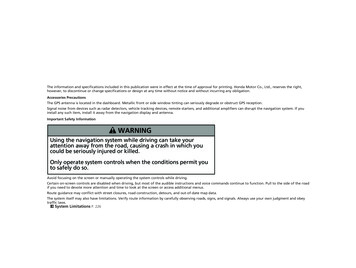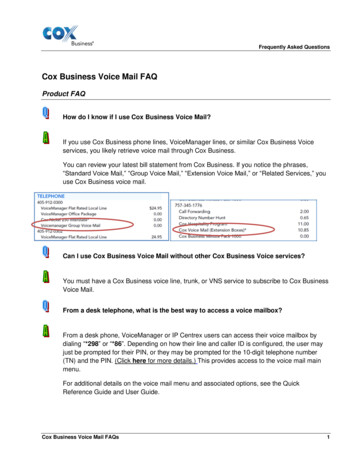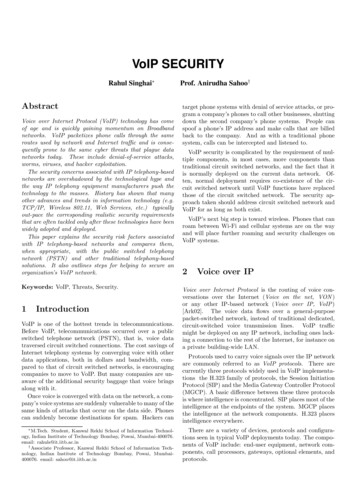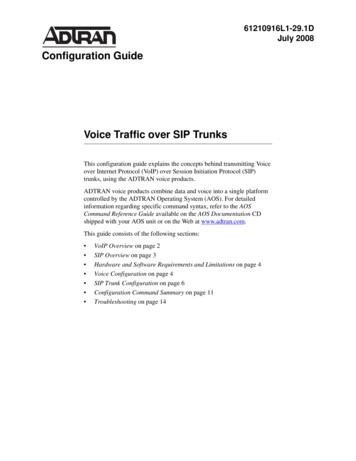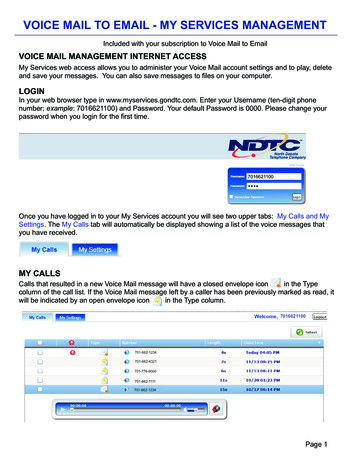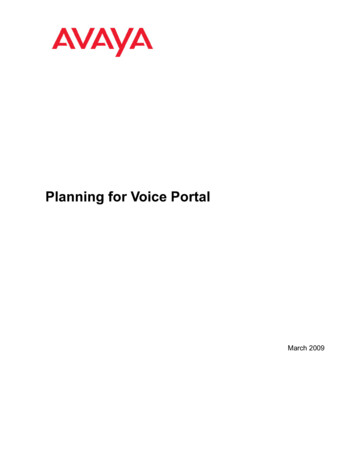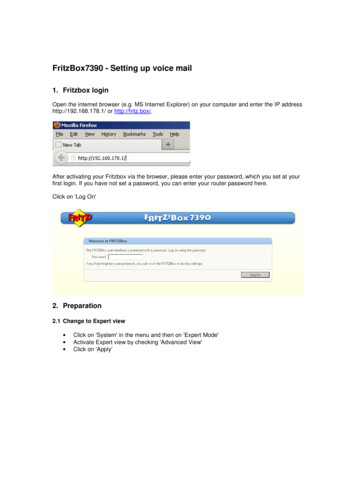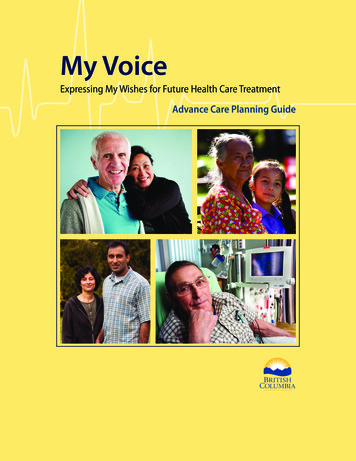
Transcription
My VoiceExpressing My Wishes for Future Health Care TreatmentAdvance Care Planning Guide
February 2013The use of this guide is voluntary and is intended to supplementconversations with your close family or health care providersabout the advance care planning options that may be right foryou. In addition, the forms provided reflect the law at the dateof publication. Laws can change over time. This guide does notreplace medical or legal advice.Library and Archives Canada Cataloguing in PublicationMy Voice -- Expressing My Wishes for Future Health CareTreatment.Includes index.ISBN 978-0-7726-6524-91. Advance directives (Medical care)--British Columbia-Popular works. I. British Columbia. Ministry of Health II. Title.R726.2 M9 2011344.71104’197C2011-909048-1Health authority document printing reference numbers:FH: 349976PHSA: PHSA240IH: 807025VCH: 00089414NH: 1752VIHA: 90444
AcknowledgementsThe Ministry of Health acknowledges Fraser Health for their permission to adapt their My Voiceworkbook into this new provincial guide for advance care planning. Thanks are also given to themany physicians and patients who shared their time and ideas. The guide was produced by theMinistry of Health in partnership with:the northern way of caring
Table of ContentsIntroduction2Why is an Advance Care Plan Important?3Developing Your Advance Care PlanBeliefs, Values and WishesLife Support and Life-Prolonging Medical Interventions556Advance Care Planning OptionsTemporary Substitute Decision Maker (TSDM)Representation AgreementsAdvance DirectiveA Representation Agreement and an Advance DirectiveEnduring Power of Attorney8911141619Changing or Cancelling Your Advance Care Plan20Definitions of Terms22Putting Your Papers in Order25My Advance Care PlanMy Advance Care Plan - SummaryMy Temporary Substitute Decision Maker (TSDM) ListMy Beliefs, Values and WishesMy Representative: Standard (RA 7) and Enhanced Agreements (RA 9)Representation Agreement (Section 7)Form 1: Certificate of Representative or Alternate RepresentativeForm 2: Certificate of MonitorForm 3: Certificate of Person Signing for the AdultForm 4: Certificate of WitnessesRepresentation Agreement (Section 9)My Advance Directive2728303234404142434450Resources52Wallet Card52Page 1Advance Care Planning Guide
IntroductionHaving a voice in decisions about your health care treatment is important. There may come a timewhen, due to illness or injury, you are incapable of expressing your treatment wishes to healthcare providers. By planning in advance, you can be sure that your family, friends and/or health careproviders know your wishes, and can ensure these wishes are followed.New incapacity (or personal) planning legislation came into force in B.C. on September 1, 2011,providing adults with more options for expressing their wishes about future health care decisions.The legislation allows capable adults to put plans into place that outline the health care treatmentsthey consent to or refuse based on their beliefs, values and wishes. If no decision/plan is in place,B.C.’s health care consent legislation gives regulated health care providers specific direction regardingwho they must choose to make decisions on a person’s behalf.This guide and workbook pages in the second half of this booklet will help you complete an advancecare plan that outlines your wishes about health care decisions in the event you are unable to do so.It will help you consider what is important to you, help you document your beliefs and wishes, andhelp you develop the advance care plan that best suits you.Depending on the advance care plan you choose, you may be required to complete legal forms toensure that your wishes are followed. The guide includes forms that you can complete without theassistance of a lawyer or notary public, which will be legally valid if completed properly. For complexsituations, you are encouraged to obtain legal advice to ensure the forms and what you write in themwill meet your needs.Advance Care Planning GuidePage 2
Why is an Advance Care Plan Important?As long as you are capable of understanding and communicating with your doctor, nursepractitioner, registered nurse and/or other health care provider, you will be asked to make your ownhealth care treatment decisions.However, no one knows what tomorrow will bring. A serious accident or illness can result in youbeing incapable of making your own health care decisions at the time care is needed. An advancecare plan allows for such a possibility. It provides family or close friends and health care providerswith a guide to your care and treatment, based on your wishes.An advance care plan can answer: Who do you want to make your health care decisions for you? What health care treatment(s) do you agree to, or refuse, if a health care providerrecommends them? Would you accept or refuse life support and life-prolonging medical interventionsfor certain conditions? What are your preferences should you need residential care and not be able to becared for at home?Mary is 54 years old, divorced, likes sports and has two adult children. Two monthsago she was struck by a car while riding her bike. She is still unconscious andneeds a ventilator to breathe. The doctors say Mary has permanent brain damageand will not recover from her injuries. Even if she wakes up, she will never be ableto walk, talk or breathe again on her own. Herdaughters have been constantly at her side. NowMary is fighting infection in both her lungs, isvery uncomfortable, and the doctors say Marymay die in a few weeks. They recommend takingMary off the ventilator and that it would be morecomfortable to allow a natural death for Mary. Onedaughter thinks this is best but the other daughter,who is six months pregnant, wants every possibleintervention until Mary’s first grandchild is born.Page 3Advance Care Planning Guide
If Mary had shared her wishes for future health care through advance care planning, it would helpher daughters and health care providers know more about Mary’s beliefs, values and wishes for herhealth care during this difficult time. It would guide the decisions about care and treatment Marywould make if she could decide for herself.Advance care planning is about having conversations with your close family, friends and health careprovider(s) so that they know the health care treatment you wish to have, or refuse, if you becomeincapable of expressing your own decisions.Writing down your beliefs, values and wishes for future health care is an advance care plan. Youradvance care plan may also include additional legal documents.In British Columbia, health care providers are expected to respect an adult’s wishes for health carethat they expressed while capable. Whether you have expressed your wishes in an advance care planor not, health care providers will make medically appropriate treatment recommendations for you.Making an advance care plan lets others know the decisions you would make for yourself, and willgive your family and friends the knowledge and tools they need for the future. An advance care planis a choice. It is a choice that will help alleviate some of the stress your family and friends could face ifthey are asked to make important health care decisions for you.Advance Care Planning GuidePage 4
Developing Your Advance Care PlanBeliefs, Values and WishesAdvance care planning begins by thinking about your beliefs, values and wishes regarding futurehealth care treatment, and talking about them with family or friends, and health care provider(s).When the people you trust know what is important to you with regard to future health caretreatment, it is easier for them to make decisions on your behalf.The following examples may help you figure out what is important to you.These things make my life meaningful: Spending time with my family and friends Love for my pet/music/art/garden/work/hobbies/fresh air/sports Practising my faithWhen I think about what my death could be like, I take comfort in: Knowing any pain I have will be treated Believing I will have good care and my family continues to be with me Believing there is something after death, even if I don’t know whatWhen I think about dying I worry that: I may struggle to breathe I may have uncontrolled pain I might be aloneWhen I am nearing the end of my life I want: My family nearby Someone holding my hand My religious leader to visit me To hear people talking gently about my life’s happy memories To listen to the music I love A window kept open no matter what the weatherPage 5Advance Care Planning Guide
Life Support and Life-Prolonging Medical InterventionsThinking and talking about your wishes for life support and life-prolonging medical interventions isvery important, especially if you have a serious or life-threatening illness. Your advance care plan canaddress different situations, such as your hospital care during and after routine surgery, care in theevent of an accident, or end-of-life care decisions.Physicians and other health care providers will always offer medically appropriate health care basedon clinical assessment. Health care providers will want to ensure any symptoms like pain, dizziness,nausea, bleeding or infection are always understood and addressed. As long as you can understandand communicate, your health care provider will explain the medically appropriate care best for you,including any risks, benefits or alternatives. They will also ask if you have any questions and if youwish to accept or refuse the health care treatment.Some of the hardest decisions deal with the use of life support and life-prolonging medicalinterventions. Medical interventions can include a ventilator to help with breathing, tube feeding,kidney dialysis, or cardiopulmonary resuscitation to restart the heart and lungs. These treatments areoffered when a health care provider believes they are medically appropriate.The questions below can help you think about the life support or life-prolonging medicalinterventions you may wish to accept or refuse in future.If you have a chronic condition: What stage is my health condition at and how might it progress? Can my condition affect my memory or ability to decide for myself in the future? Will it become life-threatening? What life support or life-prolonging medical interventions might I need due to this condition? What does my health care provider suggest I consider and address in my advance care plan?Advance Care Planning GuidePage 6
If you have a life-threatening illness or injury, do you want to accept or refuse: Cardiopulmonary resuscitation (CPR)? All, some, or no life support or life-prolonging medical interventions when a health careprovider says the health care treatments are medically appropriate? A trial period of life support and life-prolonging medical interventions, allowing a naturaldeath to occur if your condition is not going to improve?You may wish to ask yourself, "Would I want life support or life-prolonging medical interventions if itmeans I could no longer": Enjoy my life and activities the same way I do now? Get out of bed, walk or go outside on my own? Recognize and communicate meaningfully with my relatives or friends? Think for myself?Page 7Advance Care Planning Guide
Advance Care Planning OptionsThere are a number of options available to communicate your wishes and instructions in the eventthat you are not capable of doing so yourself. Your personal circumstances, and the type of advancecare plan you wish to create will influence the options you choose.Advance Care Planning BasicsEvery advance care plan should consist of these three things:Conversations with family or friends and health care providersabout your beliefs, values and wishes.Writing down your beliefs, values and wishes for future healthcare treatment.Writing down the contact information for the people who qualifyto be on your Temporary Substitute Decision Maker list.Advance Care Planning OptionsThe following items are optional depending on your advance care planning needs:Standard RepresentationAgreement: Section 7Allows you to name a person to make routine financial managementdecisions, personal care decisions and some health care decisions.Does not allow the person to refuse life support or life-prolongingmedical interventions for you.Enhanced RepresentationAgreement: Section 9Allows you to name a person to make personal care decisions andsome health care decisions, including decisions to accept or refuse lifesupport or life-prolonging medical interventions for you.Advance DirectiveAllows you to state your decisions about accepting or refusing healthcare treatments, including life support or life-prolonging medicalinterventions, directly to a health care provider.The advance directive must be followed when it addresses the healthcare decision needed at the time. No one will be asked to make adecision for you.Enduring Powerof AttorneyAdvance Care Planning GuideAllows you to appoint someone to make financial and legal decisionson your behalf if you become incapable.Page 8
Temporary Substitute Decision Maker (TSDM)A temporary substitute decision maker (TSDM) is chosen if you have not legally named an individual(representative) to make health care decisions for you when you are incapable of making themyourself.The TSDM is chosen by your doctor or other health care provider from a list you can fill out. The orderof the people who qualify to be on the list is determined by B.C. law. To be able to act as a TSDM, theperson must be 19 or older, be capable, have no dispute with you, and have been in contact with youin the past year.One person on the list below must be approached in the order given:1.2.3.4.5.6.7.8.9.Your spouse (married, common-law, same sex - length of time living together doesn't matter)A son or daughter (19 or older, birth order doesn’t matter)A parent (either, may be adoptive)A brother or sister (birth order doesn’t matter)A grandparentA grandchild (birth order doesn’t matter)Anyone else related to you by birth or adoptionA close friendA person immediately related to you by marriage (in-laws, step-parents, step-children, etc.)You may not change the order of the list. A person lower down on the list may only be chosen as yourTSDM by your health care provider if all the people above them do not qualify or are not available.If you know that you want someone lower on the list to make your health care decisions, then youshould name that person legally as your representative using a representation agreement form.There are two different types of representation agreement forms at the back of this guide. Be sure touse the one that meets your needs. More information on the differences between these two types ofrepresentation agreement follows in the next section.Your TSDM is legally required to make decisions that respect your wishes. If you have had discussionsabout advance care planning and written down your beliefs, values and wishes, your TSDM will knowand be able to speak to your wishes when asked to make health care treatment decisions for you.Page 9Advance Care Planning Guide
If you are happy with a TSDM being chosen in the event one is needed, your advance care plan willconsist of the following: Discussing your beliefs, values and wishes with close family or a trusted friend; Writing down your beliefs, values and wishes (p.30); and Filling out your TSDM list (p.28) with the contact information of people who may beapproached, in order, by a health care provider if a TSDM is needed.Pat, 47, is an office worker in good health wholives in a small northern town. She has beenmarried to Tom, 49, for 24 years and they havethree children aged 20, 17 and 14. The twoyoungest live at home and the eldest movedaway last year to attend college. After losing anumber of family and friends over the past few years, Pat began to thinkabout her future health care decisions. She spoke about her feelings andconcerns with Tom. It turned out Tom was having many of the samethoughts as Pat. Together they decided to do advance care planning sothat each would know the other’s wishes for future health care decisions.Pat and Tom chose to document their beliefs, values and wishes and simply fill out their TSDM listsbecause: Pat and Tom are in a long term, stable relationship; They trust each other to make good decisions for each other by honouring their beliefs,values and wishes; As spouses, they are at the top of each other's TSDM list; and Pat has discussed her beliefs, values and wishes with her adult child and her mother, whowould qualify as the two next TSDMs if Tom is not available.Advance Care Planning GuidePage 10
Representation AgreementsAdults in British Columbia may name a representative in a representation agreement if theywant a specific person to make certain types of decisions on their behalf. There are two types ofrepresentation agreements.Standard Agreement: Section 7 Representation AgreementA section 7 representation agreement allows you to name a representative to make decisions aboutthe routine management of your financial affairs, your personal care, and some health care treatmentdecisions. It does not allow your representative to make health care treatment decisions for you thatinvolve refusing life support or life-prolonging medical interventions.A standard agreement may be an option for adults who are assessed by a health care provideras being incapable of making an enhanced (section 9) representation agreement. A section7 representation agreement allows adults with lower levels of capability (e.g., due to somedevelopmental disabilities or injuries/illnesses of the brain that affect cognitive ability) to do someadvance care planning.Adults who have the capability to make a section 9 representation agreement may choose to make asection 7 representation agreement if it addresses their needs.Completing a section 7 representation agreement as part of your advance care plan involves thefollowing: Discussing your beliefs, values and wishes with close family or a trusted friend; Writing down your beliefs, values and wishes (p.30); Naming your representative and writing down your instructions in a representationagreement, using a section 7 form (p.34); and Filling out your TSDM list with the contact information of people who may be approachedby a health care provider if a TSDM is needed, in the event your representative resigns or isunavailable, or a decision about life support or life-prolonging medical interventions isrequired (p.28).Page 11Advance Care Planning Guide
Michael, 38, was in a serious motorcycle accident 10 years ago. He suffered a head injury,became paralyzed and has ongoing memory problems as a result of the accident. He issingle, his parents are deceased, and he has one younger brother he is close to who livesoutside the province. Michael has been living alone in his own apartment for the lasteight years. Specialized equipment and visiting home support workers enable him to beas independent as possible. His best friend, Ben, takes him shopping every week and tomedical appointments. Michael’s health has been good although he says his memory hasworsened in the last year, making decision-making difficult. He has become increasinglydependent on Ben to ensure his bills are paid on time and to schedule and attend hismedical appointments with him. Michael’s community nurse has suggested he name arepresentative to help him manage his personal, financial and some health care decisions.Michael is eligible to complete a section 7 representation agreement because, in consideration of allrelevant factors, he: Can communicate his desire to have a representative to help him make decisions about hispersonal care, routine finances and some health care, and he understands that hisrepresentative may make, or stop making, decisions that will affect him; Trusts his friend Ben and knows Ben cares about him; Knows and understands that he does not want Ben to make decisions about refusing lifesupport or life-prolonging medical interventions; Ben qualifies and has agreed to be named as his representative; and Although his brother lives outside B.C., he does stay in touch and would qualify as Michael'sTSDM if health care decisions were needed about life support.Enhanced Agreement: Section 9 Representation AgreementA section 9 representation agreement allows you to name a representative to make decisionsabout personal care and health care treatments, including decisions about accepting or refusinglife support and life-prolonging medical interventions. A representative named in a section 9representation agreement may not make decisions about your financial matters. In order forsomeone to make financial decisions for you in the event you become incapable, you can appointa person (called an attorney) using an enduring power of attorney form (see p.19 for moreinformation).Advance Care Planning GuidePage 12
Completing a section 9 representation agreement as part of your advance care plan involves thefollowing: Discussing your beliefs, values and wishes with close family or a trusted friend; Writing down your beliefs, values and wishes (p.30); Naming your representative and writing down your instructions in a representationagreement, using a section 9 form (p.44); and Filling out your TSDM list with the contact information of people who may be approachedby a health care provider if a TSDM is needed, in the event your representative resigns or isunavailable (p.28).Gurdeep, 74, moved to Canada 10 years ago with his wife Rani, who speaks littleEnglish. Gurd’s health has been poor for seven years. He has kidney disease, diabetesand high blood pressure. He needs kidney dialysis three times a week, and hascongestive heart failure that worsens every few months. He and Rani live with theiroldest son, Jeet, who helps with his care and goes to Gurd’sdoctor’s appointments with him. Gurd has five other childrenwho live nearby, and has a good relationship with all of them.As Gurd’s health is clearly declining, his doctor suggests hedo advance care planning so that his wishes are known andit is clear who will make decisions for Gurd if he becomesincapable of deciding for himself.Gurd talked with his wife and children, and identified that hewould prefer to stay at home to the end of his life, rather thanin hospital or a residential care facility. He worries about being in pain, and wouldnot want to be hooked to machines to prolong his life. Despite his health concerns,he would also like to be an organ donor. He decides that he would like Jeet to makehealth care treatment decisions for him, if he is incapable.Page 13Advance Care Planning Guide
Gurd chose to complete a section 9 representation agreement because: Jeet is not at the top of the TSDM list and must be named as Gurd’s representative in order tobe asked to make his health care decisions; Gurd knows Jeet can talk easily with his doctor without a translator; Gurd trusts Jeet will make health care treatment decisions that honour his beliefs, values andwishes, and that he will include Rani in important conversations; and A section 9 representation agreement will allow Jeet to accept or refuse life support andlife-prolonging medical interventions.Gurd may wish to name one of his other children as his alternate representative in case Jeet resigns.In addition, or alternatively, Gurd could make an advance directive, noting on the section 9representation agreement form that his advance directive may be followed directly by a health careprovider without his representative being asked to decide. These options would ensure Gurd’s wishesand instructions for health care treatments are followed.Advance DirectiveAn advance directive allows a capable adult to clearly state their decisions about accepting orrefusing health care treatments, including life support and life prolonging medical interventions, andprovides those instructions and decisions directly to a health care provider(s). Your advance directivemust be followed as long as it addresses the health care treatment you need at the time. A TSDMwill be chosen only when a health care treatment decision is needed that is not addressed by youradvance directive.Completing an advance directive as part of your advance care plan involves the following: Discussing your beliefs, values and wishes with close family or a trusted friend; Writing down your beliefs, values and wishes (p.30); Outlining your decisions for future health care treatment in an advance directive (p.50); and Filling out your TSDM list with the contact information of people who may be approachedby a health care provider if a TSDM is needed to make a health treatment decision which isnot addressed in your advance directive (p.28).Advance Care Planning GuidePage 14
Jenny, 58, moved to Canada 24 years ago from China. She is unmarriedwith no close family. She is a private person with a cat and a smallgroup of friends, including her close friend Rose who travels frequently.Jenny has been healthy all her life until one month ago when she feltstrong chest pains while walking up a steep hill. After several tests,Jenny’s doctor said her arteries are becoming blocked, her cholesterolis too high, and she is at serious risk of a heart attack. He prescribedmedication for her condition, suggested she quit smoking and referredher to a heart specialist for further care. Hesuggested she think about doing advancecare planning to ensure her health caredecisions are known and respected by herhealth care providers since she has no closefamily. After thinking over what life supportand life-prolonging medical interventionsshe might need if her condition worsens,Jenny chose to make an advance directive.Jenny chose to complete an advance directive because: Jenny does not have any family and her close friend may not be available for a health careprovider to choose as her TSDM; Jenny can set out her wishes and instructions for life support and life-prolonging medicalinterventions and when she may want them to be started, continued or stopped; and Jenny’s doctor knows Jenny and her hopes and wishes for the future much better after havingan advance care planning conversation with her, and having a copy of her advance directive.Jenny may wish to talk with her friend Rose or someone else she trusts about her wishes, and ensurethey are identified in her list of contacts to act as TSDM if needed. She may also wish to make anenduring power of attorney to provide for someone to manage her finances and property if shebecomes incapable of doing so herself (see p.19 for more information).Page 15Advance Care Planning Guide
A Representation Agreement and an Advance DirectiveDifferent personal circumstances may influence whether an adult chooses to make a representationagreement, an advance directive, or simply to discuss their beliefs, values and wishes with closefamily and friends and identify contact information for a TSDM. British Columbia’s personal planninglaws also provide the option of choosing to have both a representation agreement and an advancedirective.If you have both a representation agreement and an advance directive, and want your advancedirective to be followed by your health care provider without your representative being asked for adecision, then you must state this in your representation agreement.Completing a representation agreement and an advance directive as part of your advance care planinvolves the following: Discussing your beliefs, values and wishes with close family or a trusted friend; Writing down your beliefs, values and wishes (p.30); Naming your representative in a representation agreement using a section 7 (p.34) orsection 9 (p.44) form; Outlining your decisions for future health care treatment in an advance directive (p.50)[note: you will need to state in your representation agreement that a health care providermay act in accordance with the instructions in your advance directive without the consentof your representative if this is your wish]; and Filling out your TSDM list with the contact information of people who may be approachedby a health care provider when a TSDM is needed to make a health treatment decision if yourrepresentative resigns or is unavailable and your advance directive does not apply (p.28).Advance Care Planning GuidePage 16
A Section 7 Representation Agreement and an Advance DirectiveMaking an advance directive in addition to a section 7 representation agreement provides specificinstructions directly to your health care provider(s), as long as you write in your representationagreement that your advance directive may be acted on without your representative being asked tomake health care decisions for you.Marie, 34, was diagnosed and treated for early psychosis when she was 16. Most ofthe time she functions well, manages her symptoms, and can look after herself. Sheis married to Tony, who works away from home periodically. Her sister, Jeanne, livesnearby and helps Marie whenever she can. When Marie is unwell, it is usually dueto recurring symptoms of psychosis. When this happens, she becomes incapable oflooking after herself and her home. Assessment and treatment of her symptoms maybe done at home, but at other times she is admitted to an inpatient psychiatric unitat the local hospital. This cycle has repeated itself every year or two, and when Marie’ssymptoms are severe, she sometimes refuses the treatment that can make her stable.After her last stay in hospital, Marie spoke with Tony, her psychiatrist and Jeanneabout longer-term planning for her care during these events. On her last visit, Marie’sfamily doctor suggested she do advance care planning to make future health caretreatment and personal planning decisions. It was suggested that Marie name arepresentative to ensure her care and routine financial needs are looked after if
Library and Archives Canada Cataloguing in Publication My Voice -- Expressing My Wishes for Future Health Care Treatment. Includes index. ISBN 978--7726-6524-9
